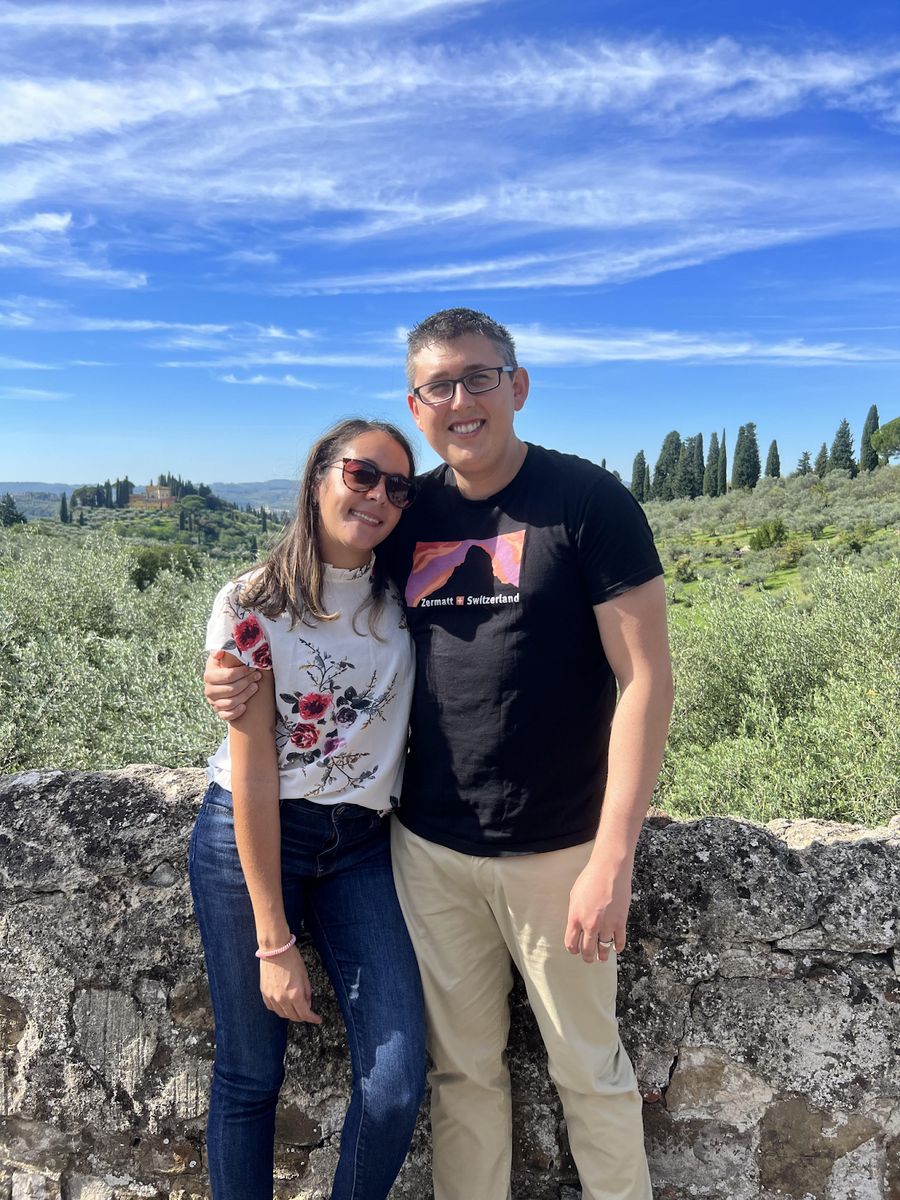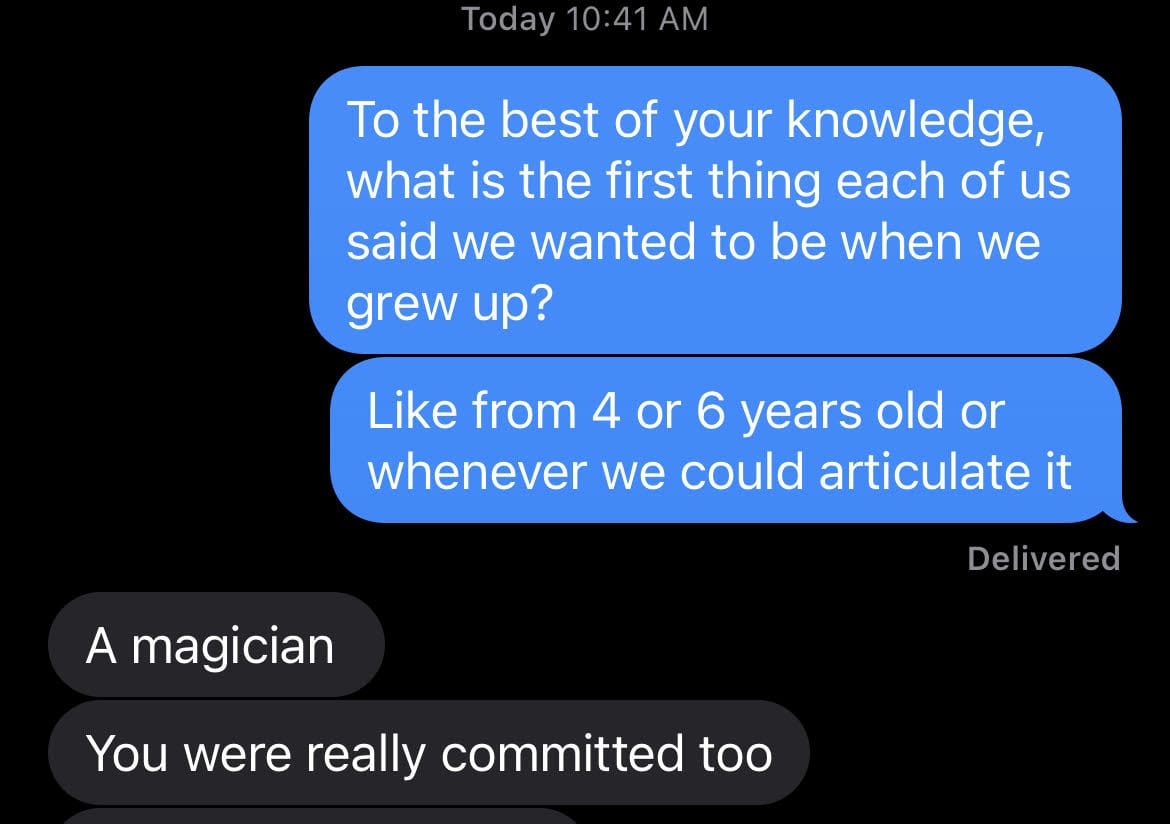- Michael Kuhlman's Blog
- Posts
- 1st Blog 11/22/22
1st Blog 11/22/22
Introduction, Magic, Consciousness, The Master and His Emissary, The Truth Against Reality
November 22, 2022
It’s probably a poor idea to start a blog in 2022, but at this point in my life it’s a hell of a lot more interesting for me than not doing one. Welcome. It’s good to meet you, even if only through this digital medium. I’ve much to say, and I’m glad you’re here and reading along, no matter who you are. Something in me compels me to speak, write, and share ideas with whoever will listen. There’s a poetic beauty in the idea of the fruitless attempt at reaching immortality through writing. If you don’t know me yet, I’d like to introduce myself and give you some of my background and set up some context. My goal is to provide value and entertainment while processing through all the crazy shit going through my mind. Even if it’s just for a short moment in time, my hope is for you to feel my presence in these words, as if I’m reaching you such that I can be a real person in your conscious awareness. My belief, since 2016 or so, is that the thoughts and feelings inside conscious agents may be more real than the physical realm of atoms and matter. As I’ve come to learn, this is actually a very old idea, an ancient one in fact, and what we mean by “reality” is likely just a matter of definitions. I really believe this, and this is my action upon that belief that thinking and sharing might be the most real thing any of us humans actually do in this life. I hope to develop this idea alongside you in due time.
My name is Michael Kuhlman, and I am turning 30 years old in eight days, as of this writing. I live with my wife in Orlando, Florida. We’ve been together for seven years, married for two. We bought a house in August 2020, and got married a few months later that November. I work in a corporate office for a large non for profit healthcare company. I hold a leadership position, but I don’t care much about titles, instead preferring to see how I can provide the most help to those around me and the most value to the company and their mission I believe in. They compensate me pretty well, too, which is a weird curse in its own right, because I’ve let it become a mental block from getting what I really want out of life.

So what am I up to by doing this, by writing this? Or by working on my Youtube channel? Or by working on self-develop at all? I’m happy to report I feel like a generally happy and content person, but I’ve always wanted to earn money, fame, and recognition for myself so as to not have to answer to anyone aside from myself. I want to see if I can do it, if I have what it takes to be interesting to interesting people out there. I can be plenty hard on myself as it is, so I don’t need an annoying dumb boss giving me bullshit tasks until it’s time to clock out. I’ve got too much to do in this life to answer to anyone on that mundane level. In my current work life, I’m fortunate I’ve been able to cultivate a position where I’ve been able to follow leaders that I would choose as guiding mentors anyway, regardless of status hierarchy. I follow the people I follow out of choice and respect, not merely because I’m told to follow.

Give me that competence hierarchy, daddy Peterson. I grew up in Maryland and I fucking love lobsters.
In an ideal world, everyone would be in the right job for them based on their level of competence. I want that for everyone, and it’s a shame inefficient discrepancies within the system seem to prevent this from occurring. For me, it's a balance between luck and opportunity to cultivate competency, and I’m fortunate I’ve been able to manifest a fair share of both so far in my career.
I’m a collector of ideas and philosophies. I love learning about different approaches and alternate perspectives because there doesn’t seem to be one right way to do this whole “Life” endeavor. I am curious about humans and their daily habits, what they believe, or what they think they believe, or how they act on what they think they believe. I want to know the reasons behind actions, so I can understand other people’s “why”. I grow bored easily, and I’ve learned I need to keep myself occupied to promote good mental, physical, and spiritual health in myself, so I can pass that along to everyone else. I’m interested in a variety of topics, lately including: Buddhism, meditation, spirituality, finance, competition (1v1 or against myself), entrepreneurship, love, health, film, books, writing, drawing, painting, self improvement, travel. The list is always growing.
I’ll start this first post with you by exploring one of my all time favorite topics: Magic. I’m naturally open-minded, and the context of my approach is that I’m firmly a rationalist in the traditional Western sense. I stay away from believing in woo woo, bullshit, or obvious quackery. Further, I tend to not believe in anything that I can’t see, feel, experience, or reproduce myself, though as one ventures into reading reported experiences of others, I’ve found the logical reasoning behind this approach quickly breaks apart. My working definition of Magic will intentionally be left open and broad as it relates to the feeling of the mystical experience. I recommend remaining open minded as I’ll do my best to gesture at the concept, as this is an area that loses its power if the discussion attempts to nail the concept down too concretely. For me, Magic is the mysterious force felt during meaningful moments; the synchronicity felt during awe inspiring or subtly comfortable experiences. The mystical experience manifests in many ways to me, such as a feeling of excitement when I see a great work of art, feel the flow of good music, have mind blowing sex, or experience oneness with the universe. Alone, this can occur during meditation, with the caveat that this ought not to be the explicit goal during a meditation practice, per se. With others, it’s what happens when one melts with the crowd on a dance floor, or when our attention is captured through listening to a great speaker. It has been reported it’s the feeling of euphoria during a psychedelic experience. Or the subtle feeling of knowing you’re in the right place at the right time when working with a team or in the midst of a satisfying conversation. Magic is what’s happening when you get that sense of comfort losing yourself in a great film, or when you feel the emotion of charismatic actors during a play. Some of it is happening right now as I write or when I get into a flow state during any other act of creation. These examples are the phenomenology of the felt experience, but there are more ideas relating to the concept of Magic that I’ve uncovered through my study of the subject over the years, and I’ll take the opportunity to briefly touch upon a few notable examples here and in the posts that will ensue.
Two recent examples come to mind, both from non fiction books relating to biology and physics. My interest in the subject of exploration of the non rational from the rational emerges from two books I’ve recently encountered. Both are well researched and written by men of sound mind who both hold advanced degrees of science in their respective fields. These authors demonstrate they know how to think well, so I’ve worked off their ideas and connected their work with my own thoughts and understanding. The first book (I’m about halfway through listening on Audible) is called The Master and His Emissary: The Divided Brain and the Making of the Western World by Dr. Iain McGilcrist. The book outlines differences between the left and right hemispheres of the brain. One example is that a right hemisphere stroke can result in left sided body paralysis, but more interestingly, the victim can experience a sensation whereby they deny their arm is theirs, instead reporting that it feels like the arm of a stranger. When asked to lift it, many will respond they are in fact lifting their arm when they are unable to physically do so. It is through this and other examples in the book that Dr. McGilchrist has managed to dispel me of the conviction of my own notions that my felt experiences are “true” in the rational sense of the word. Interestingly, the right side of the brain seems to be where perception of divinity arises from, which explains much of what the previous paragraph was gesturing towards. Along these lines, Dr. McGilchrist goes on to describe the mysterious nature in which some artists derive seemingly divine inspiration. Quote: “This gives rise to the myth of the artist as the possessor of magic powers. Magic is the way that the left hemisphere sees powers over which it has no control. This is similar to the paranoia which the left hemisphere displays in schizophrenia in relation to the intuitive actions and thought processes stemming from the right hemisphere, ascribing them to alien forces or malicious influence. Thus there is the artist as a conduit of something other than human.” (Ch 9).
This concept of a felt separate entity comes up quite often in my readings of those who report Magical phenomenon. This quote can explain the origin of Aleister Crowley’s disembodied entity, a being he called Aiwass (https://en.wikipedia.org/wiki/Aiwass), who he claimed visited him in after he spent a night in the King’s Tomb in the Great Pyramid of Giza in 1904. From this entity, he felt divinely inspired and wrote down the words that became his secret text called The Book of the Law. It is this text where the first mention of the “sacred” magic word Abrahadabra first appears.He went on to start his own religion called Thelema, which has elements of New Age thinking, things like using Yoga to astrally project and perform ceremonial magic intended to affect the physical world to bend to his will. Another example is that of a paranormal and UFO investigator named Don Elkins who claimed to have summoned a being called Ra during a series of conversations within a group seance from 1981 to 1984. I may write about these strange occurrences in a future post, but if you are curious you can read the conversations here: https://www.lawofone.info
The second book I’ve read is from Donald Hoffman titled The Case Against Reality: How Evolution Hid the Truth From Our Eyes. I’ve reviewed the book on my Youtube channel, and if you’re interested, give it a watch here: The Case Against Reality (2019) short book review. In brief summary, Hoffman lays out a logical case for the theory that consciousness may be more fundamental than physical space-time. It may be the case that our conscious experience is more fundamental than perception, in other words that whatever the mystery of what makes us feel like we are alive and breathing may be closer to the real truth than the signals our brain is outputting when we see, feel, smell, taste, and hear the world around us. It may in fact be fallacious to assume consciousness developed from a biological evolution and brain development standpoint. It may be the case that what you see is not what really is, that it may be more accurate to assume that what you see and feel is a product of evolution creating a perception to help you navigate the world to increase fitness. Think about that and let that sink in a little bit. Hoffman argues your senses are not showing you the truth of the world in front of you, a scientific sense, but instead that your eyes and ears are creating an interface by which the you that you feel is behind your eyes is perceiving to navigate the world. The argument is proposed that your perception is nothing more than a useful fiction, like operating a computer interface, but it is not necessarily revealing the truth to you. Your vision is drawn to colors and textures that give you a sense of pleasure or disgust, causing you to go seek the ripe fruit or to avoid the diseased carcass. Your perception is merely a tool that promotes fitness. The biological term “fitness”, by the way, is one I learned recently, and it refers to an organism’s ability to propagate its genes into the future. This of course led me to read another book called The Gene: An Intimate History by Siddhartha Mukherjee, and you can find that review here: The Gene (2016) Book Review
Hoffman goes on to point out a major problem modern physicians have so far been unable to address. He coins a memorable quote that “spacetime is doomed”, i.e. that it could turn out to be an error of assumption to assume space-time as fundamental. Conventional rules of physics no longer work when observing matter approaching the speed of light, or when viewing objects at the quantum level. It certainly seems to be the case that when consciousness attempts to classify objects at the quantum level, we are unable to measure either the velocity or position with accuracy. We can measure one or the other, but can’t seem to make sense of the measurements together. Hoffman argues that if consciousness is assumed fundamental, the approach towards progress in the area of physics can allow us into new territory. It’s quite strange to attempt to step outside the felt experience of our biological, rational brains of the evolved apes that we are. It certainly seems to be the case that reality may be stranger than we can literally perceive.
This seems like a good place to end for now, and I look forward to adding more in the future. I will leave you with one final tidbit about myself and why I’m interested in topics relating to Magic. I texted my mother and asked her what the earliest thing my siblings and I wanted to be when we grew up and here was her response:

As you can see, there was never any hope of escape! Thanks for reading. Stay well until next time!
-Michael